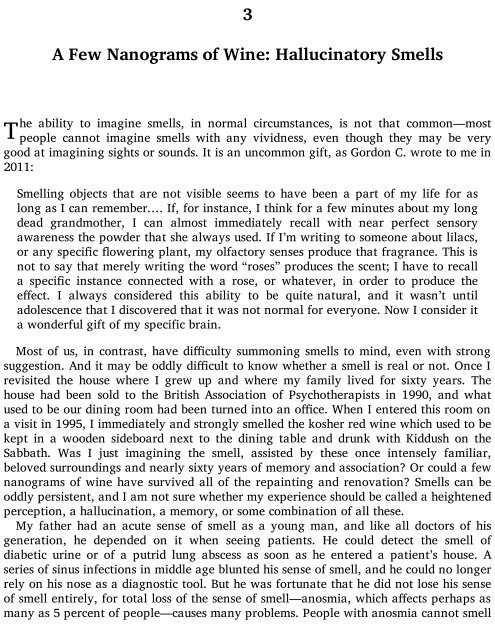32896589326509350
Create successful ePaper yourself
Turn your PDF publications into a flip-book with our unique Google optimized e-Paper software.
3<br />
A Few Nanograms of Wine: Hallucinatory Smells<br />
T<br />
he ability to imagine smells, in normal circumstances, is not that common—most<br />
people cannot imagine smells with any vividness, even though they may be very<br />
good at imagining sights or sounds. It is an uncommon gift, as Gordon C. wrote to me in<br />
2011:<br />
Smelling objects that are not visible seems to have been a part of my life for as<br />
long as I can remember.… If, for instance, I think for a few minutes about my long<br />
dead grandmother, I can almost immediately recall with near perfect sensory<br />
awareness the powder that she always used. If I’m writing to someone about lilacs,<br />
or any specic owering plant, my olfactory senses produce that fragrance. This is<br />
not to say that merely writing the word “roses” produces the scent; I have to recall<br />
a specic instance connected with a rose, or whatever, in order to produce the<br />
eect. I always considered this ability to be quite natural, and it wasn’t until<br />
adolescence that I discovered that it was not normal for everyone. Now I consider it<br />
a wonderful gift of my specific brain.<br />
Most of us, in contrast, have diculty summoning smells to mind, even with strong<br />
suggestion. And it may be oddly dicult to know whether a smell is real or not. Once I<br />
revisited the house where I grew up and where my family lived for sixty years. The<br />
house had been sold to the British Association of Psychotherapists in 1990, and what<br />
used to be our dining room had been turned into an oce. When I entered this room on<br />
a visit in 1995, I immediately and strongly smelled the kosher red wine which used to be<br />
kept in a wooden sideboard next to the dining table and drunk with Kiddush on the<br />
Sabbath. Was I just imagining the smell, assisted by these once intensely familiar,<br />
beloved surroundings and nearly sixty years of memory and association? Or could a few<br />
nanograms of wine have survived all of the repainting and renovation? Smells can be<br />
oddly persistent, and I am not sure whether my experience should be called a heightened<br />
perception, a hallucination, a memory, or some combination of all these.<br />
My father had an acute sense of smell as a young man, and like all doctors of his<br />
generation, he depended on it when seeing patients. He could detect the smell of<br />
diabetic urine or of a putrid lung abscess as soon as he entered a patient’s house. A<br />
series of sinus infections in middle age blunted his sense of smell, and he could no longer<br />
rely on his nose as a diagnostic tool. But he was fortunate that he did not lose his sense<br />
of smell entirely, for total loss of the sense of smell—anosmia, which aects perhaps as<br />
many as 5 percent of people—causes many problems. People with anosmia cannot smell

















